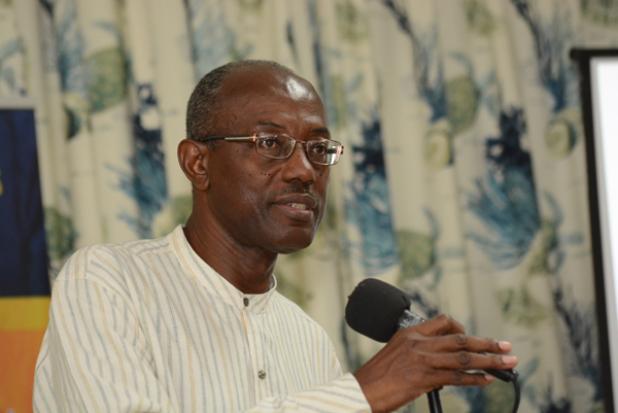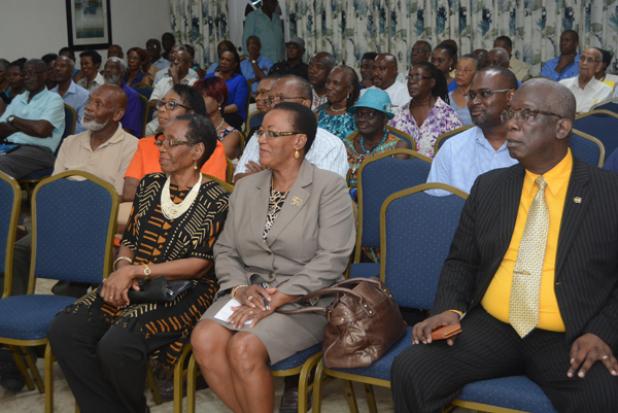
Professor Andrew Downes delivering the DLP lecture on ‘The Path to Economic Development: 50 Years After Independence’ at Almond Bay Caterers on Wednesday night.

Minister of Foreign Affairs and Foreign Trade, Senator Maxine McClean (centre) and Minister of Education, Science, Technology and Innovation, Ronald Jones (right) among those in attendance at the lecture.
Strategies highlighted to enhance economic growth
Sat, 10/08/2016 - 12:00am
By:
Patricia Thangaraj
There are various steps that this island can take if it wants to ensure that it has the capacity to sustain and enhance its economic development for the next 50 years after Independence.
This is according to Professor Andrew Downes, who delivered the Democratic Labour Party (DLP) lecture on ‘The Path to Economic Development: 50 Years After Independence’ at Almond Bay Caterers on Wednesday night.
He said that one of the steps that can be taken is for an environment that facilitates entrepreneurship to be enhanced as this would help to drive financial development as well as create employment opportunities for the citizens.
“Create an environment for new business creation and expansion, which is the essence of sustained economic growth and job creation. World Bank (Doing Business Reports) and World Economic Forum (Competitiveness Reports) have made suggestions for reducing the cost of doing business, enhancing business facilitation, enhancing productivity, etc.”
Another step that can be taken is for corporations to take advantage of trade agreements more as research indicates that companies are currently not utilising these provisions in the most effective way possible, said Downes.
“Make greater use of trade agreements to exploit export market opportunities – identification of strategic markets and management of global risks. Research shows that firms are not making use of the provisions and that private sector is not fully involved in the framing of the provisions. Exports is the key factor in economic growth.”
Another vital step that needs to be taken is for greater linkages to be formed between education and training and the world of work, an area that is especially important for us given that human resources is this country’s greatest asset.
“Forge a greater linkage between the education and training system and the work environment to ease the ‘transition from school to work’ – human capital is our key resource (employer involvement in schools, colleges and university, entrepreneurial exposure, career counselling and guidance, apprenticeships, etc.).”
The Professor also called for a policy framework to be developed where the three interrelated areas – economic expansion, job creation and skills development – would be connected.
“Establish a policy framework that would link economic expansion, job creation and skills development. The National Strategic Plan and the Growth and Development Strategy documents along with the National Employment Policy provide a useful starting point, with the HRD Strategy and Skills for the Future programme.”
A culture of monitoring and evaluation must also be created as this is presently one of the areas that Barbados falls back on, according to the World Bank report, he said.
“Develop a culture of action with monitoring and evaluation; greatest weakness has been in the area of implementation and feedback as several ideas abound. A recent World Bank report on citizens’ engagement in rule making gave Barbados 1.6/6 with weak areas being providing feedback and assessing impact, but strong on publication and consultation on regulations.”
